The war in Ukraine has been raging for a month. Rising energy prices, an exodus of foreign companies from Russia, the threat of Russian state bankruptcy – the economic consequences of the Russian attack are massive.
A month has passed since the start of the Russian attack on Ukraine, and the consequences for the global economy are massive: rising energy prices, an exodus of foreign companies from Russia, the threat of Russian state bankruptcy. An overview.
From dependency and embargoes: raw material prices at record levels
Russia is one of the largest producers of fossil fuels in the world – the war is therefore causing record prices on the international markets. At the beginning of March, crude oil of the North Sea variety Brent approached a 14-year high with a price of 139.13 dollars (126.46 euros), in February the price was still an average of 90 dollars.
Prices also rose at gas stations, and governments then passed relief measures: reduced VAT in Sweden, a price cap in Hungary, a tank discount in France. The gas price also exploded: On March 7, a megawatt hour was traded for a record price of 345 euros on the Dutch gas exchange TTF.
The US, Canada and Britain announced oil embargoes against Russia due to Russian aggression. The European Union has so far held back, as countries like Germany are heavily dependent on Russian gas supplies.
The prices of other raw materials such as nickel and aluminum have also risen rapidly recently. The automotive industry also faces supply chain issues as key parts are manufactured in Ukraine.
Rising food prices: UN warns of ‘hurricane of hunger’
Russia and Ukraine account for 30 percent of world grain exports – UN Secretary-General Antonio Guterres warned that the war could result in a “cyclone of hunger and a collapse of the global food system”. Grain and vegetable oil prices have already risen.
According to the Food and Agriculture Organization of the United Nations (FAO), the number of malnourished people due to the Ukraine war could rise by eight to 13 million this year and next.
The USA, India and Europe could replace wheat exports. In the case of sunflower oil and corn, however, this could be difficult – here Ukraine is the largest and fourth largest exporter in the world.
Ruble crash: Uncertainty on the financial markets
After a short phase of recovery from the corona pandemic, the war in Ukraine has again caused uncertainty on the financial markets. The Moscow stock exchange closed its doors for three weeks, only partially reopening last Monday.
Sanctions against Russia have crippled the country’s banking and financial system, and the Russian ruble has plummeted. $300 billion worth of Russian foreign exchange has been frozen. For the first time in decades, Russia now has to fear national bankruptcy.
Hundreds of companies withdraw – Putin threatens expropriation
Sanctions, political and public pressure have persuaded hundreds of companies to withdraw from Russia. These include well-known companies such as Ikea, Coca-Cola and McDonald’s. Russian President Vladimir Putin has threatened foreign companies that want to withdraw from Russia with expropriations.
Individual companies have decided to continue their business in Russia. They refer to their responsibility towards their employees and the population, which they want to continue to provide with existential goods.
Global economic growth threatened
All of these factors weigh on global economic growth: According to the OECD, the war could lead to a one percentage point drop in global growth. The International Monetary Fund (IMF) is also expected to lower its growth forecast for 2022 from 4.4 percent.

“The entire global economy will feel the effects of the crisis through slower growth, disrupted trade and higher inflation,” said the IMF, the World Bank and the European Bank for Reconstruction and Development (EBRD) in a joint statement. In particular, the poorest and most vulnerable would be hit.
Economists are also warning of stagflation – a mix of rising prices and weak growth. “Even if the war were over today, the consequences would still be felt for months in the form of rising commodity prices,” says EBRD chief economist Beata Javorcik AFP.
Source: Stern
Jane Stock is a technology author, who has written for 24 Hours World. She writes about the latest in technology news and trends, and is always on the lookout for new and innovative ways to improve his audience’s experience.




